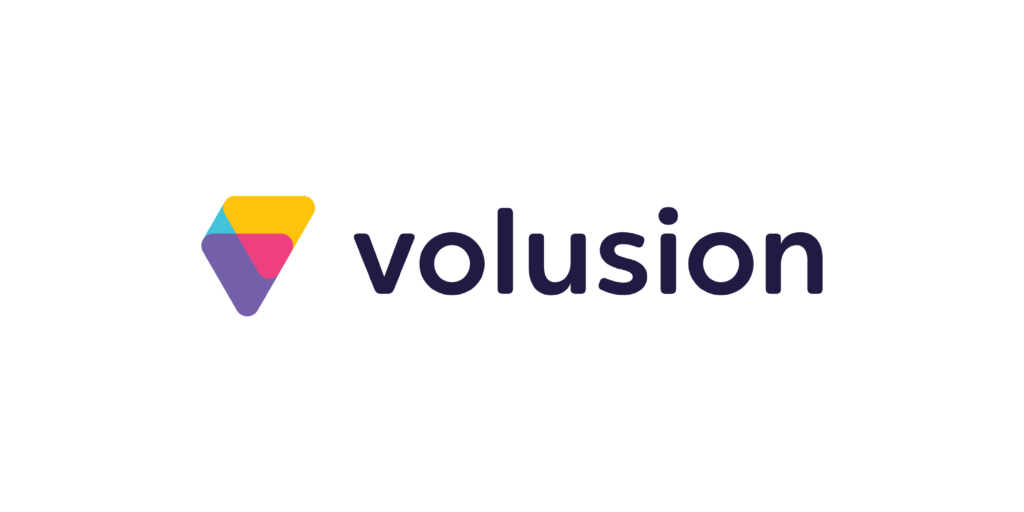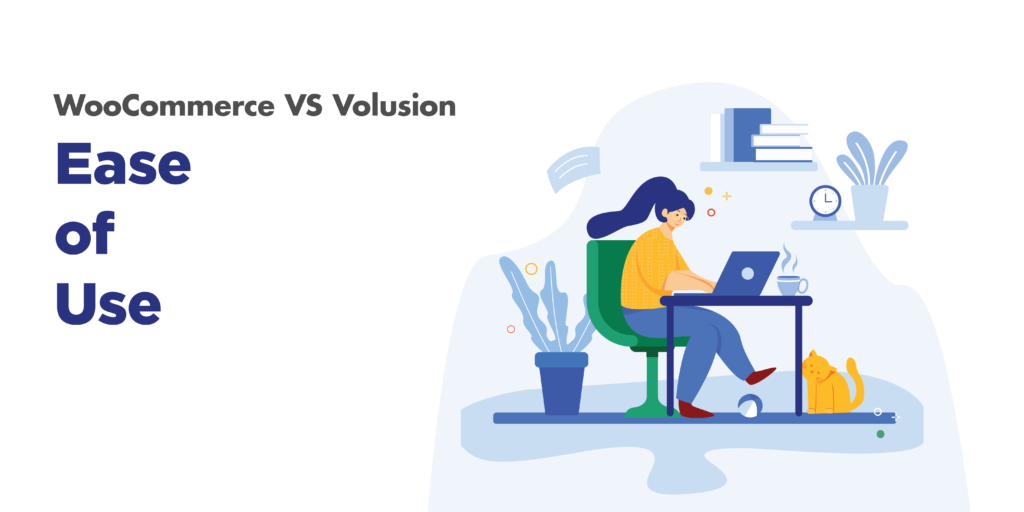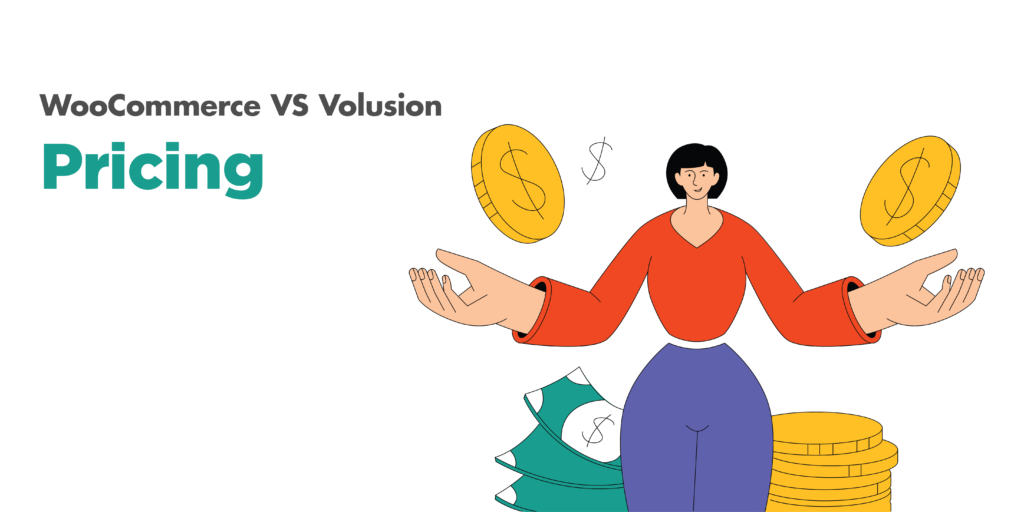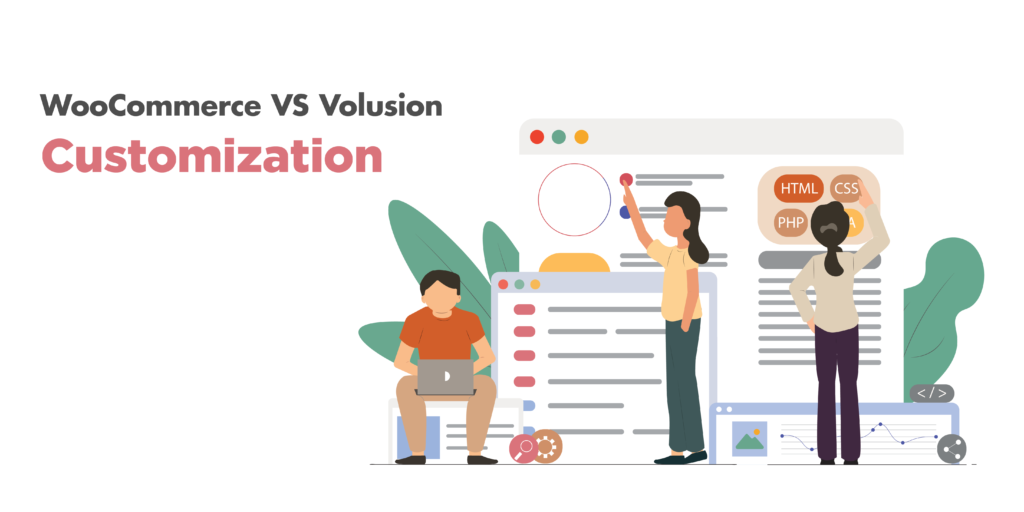Looking for the best eCommerce platform for your website? Then you have come to the right place. When it comes to eCommerce platforms, there is no perfect solution, each platform provides different benefits and all have their weaknesses as well. Therefore, we have compared two major platforms, WooCommerce vs Volusion, to help you make a perfect choice.
Depending on if this is your first website, the size of your business, and how many products you have, your need for an eCommerce platform can vary. Thus, we have chosen different aspects on which to compare WooCommerce and Volusion, such as pricing, customization, customer support, etc. hence, you don’t regret your decision later. So without further ado, let’s get started!
We have compared the two ultimate eCommerce platforms together – WooCommerce VS Shopify – Lets see which one is the winner
WooCommerce vs Volusion: Pros and Cons
WooCommerce

WooCommerce is an eCommerce plugin for WordPress that converts its site into an online store. It is a free open-source eCommerce platform that enables you to create an online shopping experience in a few minutes. This is a completely customizable and scalable platform and is suitable for all sizes of businesses. It offers integration with multiple plugins and extensions and also provides many out-of-the-box features.
Pros
- Easy to use and set up.
- Completely customizable.
- Integration with 3rd party plugins and extensions.
- No startup costs.
Cons
- Steep learning curve.
- Requires you to install WordPress.
- Domain, hosting, and security is not included out-of-the-box.
Volusion

Volusion is a hosted eCommerce platform that enables you to create a site with its comprehensive site builder, without knowing any coding, in a few minutes. It provides you an amazing set of features such as product and inventory management, SEO optimization, CRM system, and much more. You can also add plugins and extensions to increase functionality, although they do not provide integration with 3rd party products in the basic pricing plan.
Pros
- 24/7 customer support available.
- Comprehensive store builder.
- Pre-made templates are available to set up your site quickly.
- Hosting and security provided.
Cons
- Fewer options for plugins and extensions.
- Doesn’t allow much customization.
- The Basic plan does not contain some necessary features.
Convert your retail store to a fully functional wholesale store by using the best WooCommerce Wholesale plugins for your website
WooCommerce vs Volusion: Let’s Compare The Fundamentals
WooCommerce or Volusion, Which is the ultimate eCommerce solution? Find out from our detailed comparison below.
1. Ease of Use

Why choose a platform that can be a hassle to manage day-to-day operations, thus we have compared both WooCommerce and Volusion on their usability to see which one is crowned the winner.
WooCommerce is easy to use as it has an interactive user interface that is similar to WordPress. All of its features, such as product management, order processing, shipments, and inventory can easily be managed from the dashboard. It is also easy to install and the Setup Wizard guides you through the process of creating your online store in a few minutes by setting up the location, type, themes, etc. It is also a flexible platform and be easily scaled up.
Volusion is also an easy to use platform because it provides its users with an intuitive interface and store builder that helps you create a site with just a click of a button. Its setup manual guides you through the process of setting up an online store, adding products, images, descriptions, etc. Volusion also has a built-in SEO tool, thus all your listings will be optimized. Furthermore, setting up advanced features is also easy and requires no coding knowledge.
In terms of ease, Volusion is the winner as it automates all processes and can be set up easily and quickly.
By using the best WooCommerce Dropshipping Plugins you can eliminate shipping hassle, warehouse costs, and much more.
2. Pricing

As mentioned above, WooCommerce is a free WordPress plugin that you can use to create a basic website with a complete shopping cart system. But keep in mind that it does not include hosting, domain, and SSL certificates, all of which you need to buy. Although there are many out-of-the-box features with WooCommerce, for additional functionality, you can add plugins and extensions, both free and paid, to improve the user experience.
Volusion provides 3 pricing plans, for instance, Personal Plan ($29/mo), Professional Plan ($79/mo), Business Plan ($299/mo), and a Prime Plan based on your GMV. Each plan has a limited GMV threshold which if increased would require you to upgrade your plan. Although each plan consists of unlimited features, the low-priced plans lack 3rd party plugins integration, success team, and analysis reports.
In terms of pricing, WooCommerce is the clear winner as it does not restrict your growth by a plan and you can create a site according to your budget using the plugins and tools that you need.
3. Themes and Plugins

All eCommerce platforms come with a limited set of features out-of-the-box, but to add advanced or new features on your site, you can use plugins and extensions. Let’s see which platform, WooCommerce or Volusion, provides compatibility in this regard.
WooCommerce has hundreds of options for themes, plugins, and extensions, both free and paid, which you can use to improve the layout of your site and increase its functionality. It is also compatible with 3rd party plugins and doesn’t affect the speed and performance.
In terms of plugins and themes, Volusion offers limited products, less than a hundred, and from which only a few are free. The paid themes can cost you around $50-$180. Although Volusion does provide you with a drag and drop store builder where you can easily customize the themes according to your requirements.
WooCommerce vs Volusion in themes and plugins? WooCommerce is the winner as it provides more options and easier integration.
Two of the most known web-builders in the market – WooCommerce VS BigCommerce — let’s find out which one is better for your store
4. Customer Support

WooCommerce offers customer support through a ticketing system. Although it doesn’t offer live chat and call support, its extensive community provides information, blogs, articles, and much more from WooExperts. You can also find detailed documentation regarding each plugin on the official WooCommerce website. It is also dependent on the hosting service you choose.
Volusion provides 24/7 customer support through chat, phone, and forum. Although the live phone support is only available in the higher-priced plans. Moreover, the Volusion community is pretty new and small but you can easily find tutorials and forums to help you out.
In terms of customer support, Volusion is the better option due to their 24/7 live support available.
5. Customization

WooCommerce is a completely customizable and flexible eCommerce platform. With this plugin, you can easily tweak themes, plugins, and extensions to match your business style and needs. You can also easily find developers due to its immense popularity and easy coding.
When it comes to customization, Volusion is fairly rigid. It does not allow a higher degree of customization and is not user-friendly due to its complex code. Thus, tweaking plugins and extensions is far more difficult than in WooCommerce.
WooCommerce or Volusion? No eCommerce platform is a match for WooCommerce regarding customizations. Its flexibility makes it a favorite among beginners and developers alike.
Simplify your checkout page to reduce cart abandonment by using the best WooCommerce Checkout Plugins available
Conclusion: WooCommerce vs Volusion – Who’s The Winner?
I think our answer is clear enough, WooCommerce is the ultimate eCommerce platform when compared against Volusion. Although Volusion is quite a tough competitor with its advanced features, drag-and-drop store builder, customer support, etc, it’s still no match for WooCommerce.
WooCommerce’s biggest advantage is its customizability that makes it stand out from its competitors. It also provides unlimited options for themes, plugins, and extensions and thus is suitable for all types of businesses. Its easy code and interactive user-interface have made it accessible for beginners and developers and therefore it’s our winner in this comparison.



